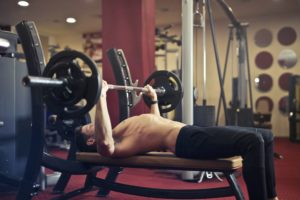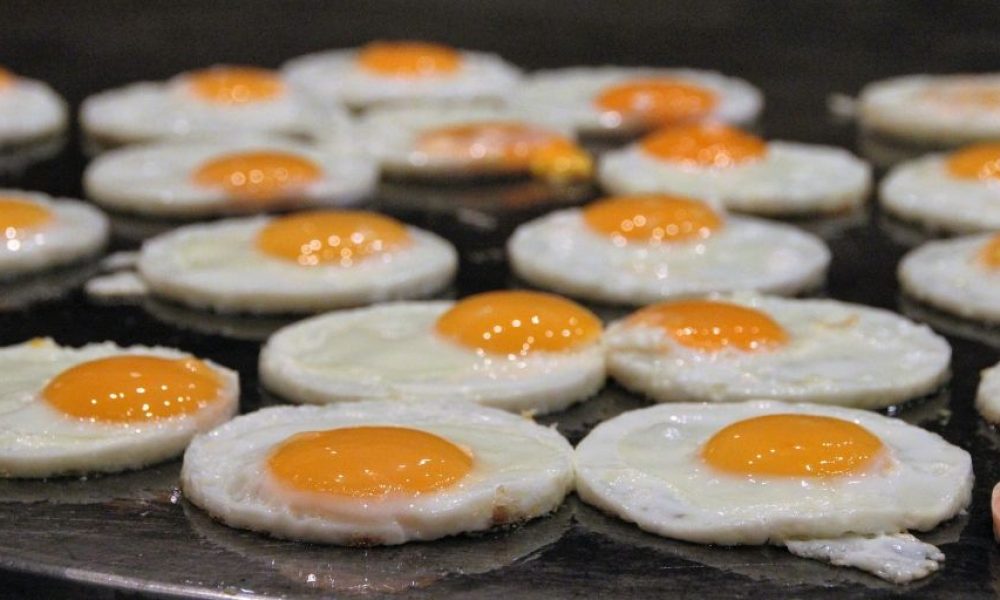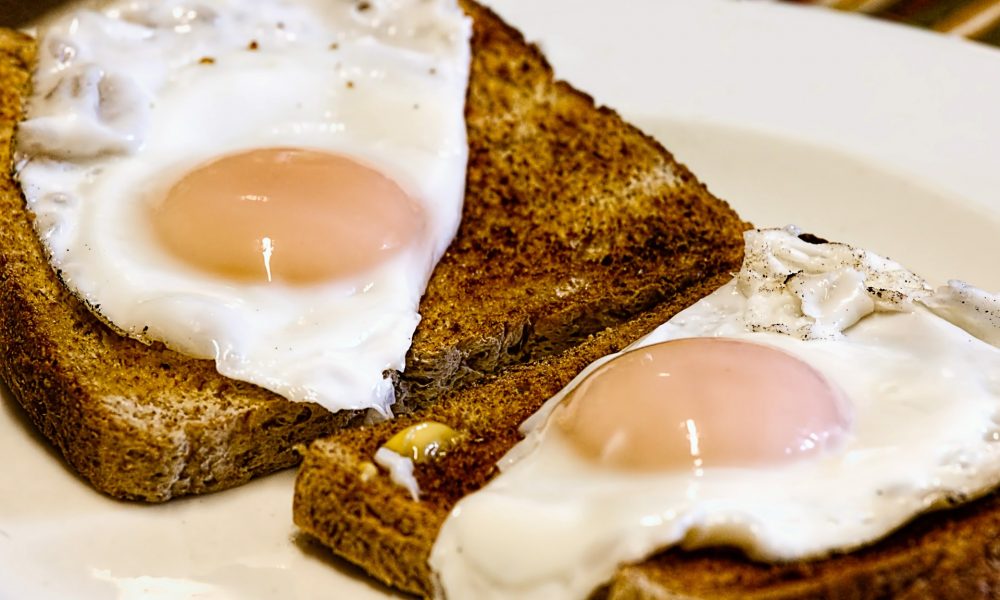
How Many Reps Should You do to Build Muscle?
Meathead bros have oversimplified that moderate rep ranges around 8-12 reps are the holy grail for muscle growth.

Cholesterol was once thought of as a dangerous artery clogging nutrient. This had led you to believe you will perish from a fatal heart attack where your family must now cover up the fact that you died from an omelette.
Fortunately, research shows cholesterol is not the enemy we once thought it was. In fact, research also shows it’s quite the muscle growing nutrient many people don’t know about. If you’re looking to get jacked, including more cholesterol in your diet will be far better than buying some bs testosterone booster from GNC.
But first, let’s talk about the myth that cholesterol is bad for you. Feel free to skip to the second half of this article if you already believe me and simply want to learn about getting yolked up from cholesterol. (haha, see what I did there?)
Cholesterol is a fatty like substance. It plays an important role in hormone production, vitamin absorption, digestion, and contributes to cell health by making cell membranes thicker.
Your own liver also produces 1000-2000 mg of cholesterol a day, so as you can see cholesterol is pretty dang important.
“But bro, my vegan aunt who does yoga said cholesterol is more evil than Satan.”
First off, no it’s not! Second, you should really stop listening to your annoying vegan family members. They might mean well, but their IQ is barely reaches double digits on a good day.
Anyways, what people fail to understand is the dietary cholesterol you consume does not significantly affect the cholesterol profile in your blood (1,24). Your body regulates cholesterol levels by making more or less depending on how much you eat.
When people talk about cholesterol clogging their arteries, they’re actually referring to lipoproteins. The 2 main kinds of lipoproteins are HDL and LDL. HDL is usually referred to as good cholesterol and LDL is usually referred to as bad cholesterol even though neither of them is technically cholesterol.
Both lipoproteins are more like escorts. They escort the cholesterol in your blood to and from the liver for various functions as well as disposal.
LDL is called the bad one because too much can plaque up your vessels. However, HDL is called the good one because it cleans up excess LDL, but regardless it’s not the cholesterol itself to blame.

For example, this study had adults eating 2 eggs daily on top of their current diet (2). Blood cholesterol increased slightly as expected. HDL also increased which is great news while LDL was unchanged.
Another study took overweight/obese mean, put them in a caloric deficit with one group eating 3 eggs a day while the other group eating little to no cholesterol (3). Both groups saw improvement in body weight and health, but the egg group saw a significant increase in HDL while the no egg group didn’t.
Other research in overweight/obese has also shown when calories are matched, even eating 3 eggs everyday for 12 weeks straight showed no effect on multiple markers of health (19).
Another study done in the elderly did show an increase in LDL, but also an increase in HDL resulting in the same ratio prior which negated any potential risk (4). The researchers concluded eggs do not cause increase the risk for health disease in the elderly population.
Furthermore, cholesterol and eggs are shown to be safe even in those with type 2 diabetes (10). After type 2 diabetics ate 12 eggs per day, health was no different than the control group even after a follow up (20).
Finally, an analysis of 3 international prospective studies across 6 continents looking at 177,000 people found eggs are not associated with blood lipids, death, or any cardiovascular disease (21). Another analysis even found eggs improve blood flow and vessel function (23).
There are people who are labeled as hyperresponders, which makes up about 25% of the population (5). These individuals genetically make more cholesterol than the average person, but fortunately even if this is you, eating eggs still won’t increase your risk.
LDL is increased in these individuals, but just like the previous study I mentioned, HDL also increases in proportion which negates most risks.
The scientific literature consistently shows dietary cholesterol doesn’t negatively affect blood cholesterol and doesn’t increase any health risk even in hyperresponders (5,6,7,8,9).
The US Dietary Guidelines have even revised their stance stating cholesterol should no longer be a nutrient of concern (11).
Heart disease is often touted as the result of cholesterol intake, but as you can see, dietary cholesterol itself plays no role in increasing risk.
On top of not understanding the difference between lipoproteins and cholesterol, I think people also fear cholesterol because they mistake cholesterol with saturated fat.
Excessive saturated fat does increase LDL in some people, but it’s actual contribution to increasing heart disease risk is fairly weak (12). However, cholesterol will still share in the blame because foods high in saturated fat usually have cholesterol tagging along.
This is why it’s important we look at each nutrient on its own. Cholesterol in of itself is necessary for many health functions on top of being well regulated in your body (18).
This then brings me to my next point which is for all my gym rats out there. If you’re already pretty healthy, increasing cholesterol intake will juice up your gains. Here’s the science if you don’t believe me.
Riechman and colleagues conducted a study where they found cholesterol had a dose response with muscle even apart from the variability in protein in people who strength train (13). The more cholesterol people ate, the more muscle they had. This was also done in elderly people, so imagine how much more of an effect it would have on younger people.
Riechman and colleagues then conducted a follow up study to put what they observed to the test by doing a 12 week randomized controlled trial in elderly subjects (14). They had 3 groups with high, medium, and low cholesterol. Muscle growth was the same between groups, but strength was significantly higher in the high cholesterol group. They gained double the amount of strength as the low group and almost 50% more than the medium group.

Another study looked at cholesterol’s post exercise effect after strength training, this time in young healthy adults (15). The high cholesterol group had over double the anabolic (muscle building) response compared to the low cholesterol group.
Similar effects are seen in egg studies where the muscle building effects of whole eggs are greater than egg whites even when protein is matched (16,17).
Most researchers conclude this is most likely caused by cholesterol’s effect on cell membrane thickness, inflammatory response, hormone production, and cell signaling (15,25).
Most recently, Bagheri et al had a weak underpowered study finding slightly better fat loss and squat strength with a whole egg strength training group consuming 800 mg of cholesterol vs an egg white group consuming about 300 mg (22). They also had more favorable hormonal profiles.
In absolute terms, organ meats will provide the most cholesterol out of pretty much any food. Things like kidney, liver, heart, and brains have hundreds of milligrams of cholesterol per serving. But those animal parts are impractical and downright gross for most of you.
The next best options are whole eggs, shrimp, and sardines.
2 large whole eggs provide over 400 mg of cholesterol along with protein and valuable micronutrients to enhance muscle growth.
Shrimp is also great. Every 100 grams (about 3.5 ounces) gives you 195 mg of cholesterol.
And finally, there’s sardines. A cheap and convenient option that gives you 142 mg for every 100 grams. Definitely one of my favorite quick protein and cholesterol sources.
Apart from those choices, most cholesterol containing foods just don’t come too close. Red meat, chicken, seafood, and cheese are decent honorable mentions with around 100 mg or less of cholesterol per serving.
Cholesterol is clearly not bad for you. Some foods high in cholesterol like eggs and sardines are some of the most nutritious foods you could eat. In fact, cholesterol is needed to live. Your hormonal health would suck like a deprived zombie without it.
As an extra bonus, cholesterol is also subtly anabolic. Most people don’t know it enhances the muscle growing effect.
So the next time you finish a workout, making a post workout shake is great, but having some eggs or sardines alongside your shake will be even better.
Bagheri R;Hooshmand Moghadam B;Jo E;Tinsley GM;Stratton MT;Larky DA;Eskandari M;Wong A; “Comparison of Whole Egg vs. Egg White Ingestion During 12 Weeks of Resistance Training on Skeletal Muscle Regulatory Markers in Resistance-Trained Men.” The British Journal of Nutrition, U.S. National Library of Medicine, pubmed.ncbi.nlm.nih.gov/32576297/.
Emamat, Hadi, et al. “The Effect of Egg and Its Derivatives on Vascular Function: A Systematic Review of Interventional Studies.” Clinical Nutrition ESPEN, Elsevier, 12 July 2020, www.sciencedirect.com/science/article/abs/pii/S2405457720301315.
Santos. “The Effect of Whole Egg Intake on Muscle Mass: Are the Yolk and Its Nutrients Important?” International Journal of Sport Nutrition and Exercise Metabolism, U.S. National Library of Medicine, https://pubmed.ncbi.nlm.nih.gov/34504041/.
Sign up for AwesomeFitnessScience Weekly. You’ll get juicy insider secrets, updates, and stories.

Meathead bros have oversimplified that moderate rep ranges around 8-12 reps are the holy grail for muscle growth.

Think of your most stubborn muscle group that’s so painfully small despite how hard you train it. Perhaps, it’s your narrow back, your chopstick calves, or your flat butt.

The forbidden fruit effect is the idea of restricting certain foods making you crave them more and thus, ruining your diet adherence or progress.